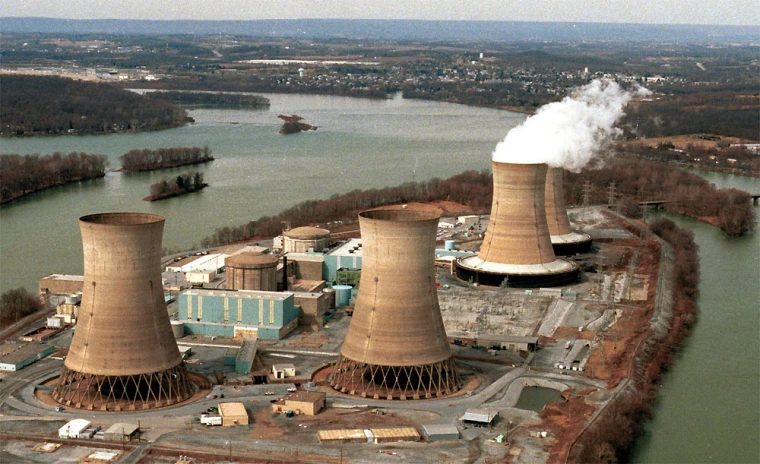The Three Mile Island nuclear plant, known for the partial meltdown in 1979, is making headlines once again. Constellation Energy and Microsoft have announced plans to restart Unit 1 of the plant in Pennsylvania by 2028.
This ambitious project is part of a growing trend where tech companies are turning to nuclear energy to meet the rising power demands of data centers, particularly those supporting artificial intelligence (AI) technologies. However, the path to reopening the nuclear plant faces several significant hurdles.
Join our WhatsApp ChannelWhy Restart the Nuclear Plant?
The rising power demands from AI data centers largely drive the decision to restart the Three Mile Island nuclear plant. According to data from the U.S. Energy Information Administration (EIA), power generation capacity in the U.S. is projected to grow by 2.4% to 2.7% by the end of the decade. Meanwhile, data center power consumption is expected to double by 2030, reaching around 9% of the country’s total electricity usage.
“AI technology is advancing rapidly, and with that comes a significant increase in energy demand,” said Kate Fowler, global nuclear energy leader for Marsh, an energy insurance broker and risk advisor. “Restarting the Three Mile Island nuclear plant offers a climate-friendly energy source to meet those needs.”
Microsoft and Constellation Energy plan to invest $1.6 billion into the restart, aiming to offset the growing energy consumption of Microsoft’s data centers in the region. This deal follows a similar arrangement between Talen Energy and Amazon, who agreed to locate a data center next to Talen’s nuclear plant in Pennsylvania earlier this year.
Regulatory and Technical Challenges
While the benefits of restarting the nuclear plant seem clear, the process will be anything but easy. The first major hurdle is regulatory approval. The U.S. Nuclear Regulatory Commission (NRC) must issue new operating licenses for the plant, which has been shut down since 2019. “The NRC currently has a full plate,” explained Sola Talabi, a nuclear engineer and president of Pittsburgh Technical, an energy risk consultancy. “They are reviewing new types of reactors and decommissioned reactors, so this project will add to their already high workload.”
READ ALSO: Experts Highlight Ways Africa Can Participate In Energy Transition For Sustainability
Even though President Joe Biden recently signed legislation aimed at streamlining the NRC’s licensing process, the timeline for securing approvals is uncertain. Public comments on the project, a mandatory part of the process, could prolong the approval period. Additionally, reconnecting the plant to the regional power grid is expected to take years, according to industry experts.
Supply Chain Issues and Community Concerns
The technical side of restarting the Three Mile Island nuclear plant presents its own set of challenges. The plant has been dormant for five years, which could complicate the process of bringing equipment and infrastructure back online. Edwin Lyman, a nuclear safety expert at the Union of Concerned Scientists, noted that sensitive components like steam generators and reactor vessels may have deteriorated over time. “Constellation should expect to encounter problems that will be costly and time-consuming to fix,” Lyman warned.
Supply chain issues are another significant concern. Since the plant shut down in 2019, global supply chains for nuclear energy have faced disruptions, particularly after Washington imposed restrictions on enriched uranium imports from Russia following the country’s invasion of Ukraine in 2022.
Local opposition may also slow down the process. The 1979 partial meltdown at the plant’s Unit 2 reactor remains a strong memory for many residents in the area, making community engagement essential. “Probably more than anywhere else in the country, the need for community engagement to ensure societal acceptance is going to be critical for the restart,” Talabi emphasized.
Water and Environmental Impact
Water usage is another issue that needs to be addressed before the nuclear plant can restart. The Susquehanna River Basin Commission, responsible for overseeing water use in the region, will review the project’s impact on local water resources. “Any modification request will be thoroughly reviewed, and the project’s expected water demands will be evaluated for sustainability and potential adverse impacts to the environment and other users,” said Stacey Hanrahan, a spokesperson for the commission.
Changes in the plant’s water permits will likely be required, as nuclear plants use significant amounts of water for cooling. Regulators will closely examine whether the plant’s water needs could strain the local water supply, particularly during dry periods.
Looking Ahead
Despite these challenges, those involved in the project remain optimistic that the Three Mile Island nuclear plant can be brought back online within the next four years. “Four years is enough for Constellation to address any technical issues, even those that could be substantial,” Talabi said. Still, the project’s success will depend on Constellation Energy’s ability to navigate regulatory, technical, and community challenges effectively.
The restart of the Three Mile Island nuclear plant represents a significant step toward using nuclear energy to power the data centers that drive AI technologies. But as history has shown, restarting a nuclear plant is no simple task. It will take time, money, and careful planning to ensure that this ambitious project can meet the growing energy demands of the future.
Emmanuel Ochayi is a journalist. He is a graduate of the University of Lagos, School of first choice and the nations pride. Emmanuel is keen on exploring writing angles in different areas, including Business, climate change, politics, Education, and others.


















Follow Us